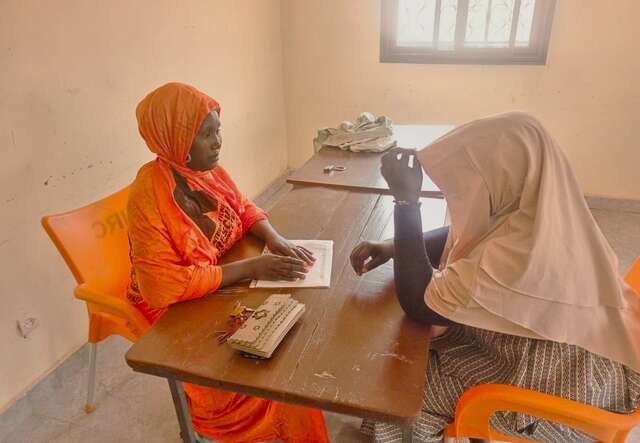Women’s resilience in Mali: Amina's story
In Ténenkou Cercle, central Mali, Amina travels to the most inaccessible communities to support women and girls facing insecurity and gender-based violence.
In Ténenkou Cercle, central Mali, Amina travels to the most inaccessible communities to support women and girls facing insecurity and gender-based violence.
“Ever since I was a teenager, people have confided in me, whether at school or at home,” says Amina. In 2021, she transformed this natural gift into a profession.
Based in Ténenkou Cercle in central Mali, Amina now travels to remote communities to support women and girls who have experienced gender-based violence.
Now in her thirties, Amina grew up in the same region where she currently works, and has seen firsthand the worsening security situation brought on by ongoing violence and conflict. As a case manager for the International Rescue Committee (IRC), she provides psychosocial support, raises awareness, and offers mental health referrals. She also organizes recreational activities in safe spaces for women and girls in Ténenkou and the nearby area of Diafarabé.
Ténenkou Cercle, home to around 250,000 people across ten communes, has been deeply affected by insecurity for over a decade. This prolonged instability has led to high levels of displacement and severely limited access to essential services like education, healthcare, and clean drinking water.

Through its work in this area, the IRC is helping to reduce mortality among vulnerable populations and to improve living conditions and the level of protection for displaced communities. Population movements expose the most vulnerable, including women, young people and children, to the risk of abuse.
Amina and her team work together with the local communities and authorities to identify and manage cases of gender-based violence (GBV). The team runs its services across eight health centers, providing vital psychosocial support.
Many victims remain silent about the abuse they have suffered for fear of being judged and rejected by the community. This trauma can have serious consequences, such as isolation and depression.
"This job isn't easy every day," says Amina. "Some of the difficulties I encounter are the cruelty of some of the stories and my feeling of powerlessness in the face of the grief of some survivors. It's often difficult for me to gain the trust of certain victims, as they fear the gaze of society and the need for confidentiality.”
"This job isn't easy every day. Some of the difficulties I encounter are the cruelty of some of the stories and my feeling of powerlessness in the face of the grief of some survivors."
Despite everything, Amina perseveres. Through various awareness-raising initiatives and involving the whole community, particularly community leaders, she has noticed an improvement in tolerance and victims no longer being stigmatized. Through training from the IRC in collaboration with the EU, Amina has learned tools and techniques for identifying and referring cases. Many victims agree to open up to her and receive psychosocial support.
"I'll never forget the case of two underage survivors of sexual abuse," Amina recalls. "The whole community, including community leaders, got involved so that they could benefit from holistic assistance.”
"The whole community, including community leaders, got involved so that they could benefit from holistic assistance.”
These happy outcomes and the acceptance of her work motivate and encourage Amina to give her best. "My dream is to see all forms of violence against girls and women disappear," she says. "I want everyone at risk of gender-based violence to be able to access prevention and care services by extending safe spaces throughout Ténenkou."
"My dream is to see all forms of violence against girls and women disappear."
In 2023, in central Mali, 54 survivors of gender-based violence received medical treatment and psychosocial support, including 11 cases of rape treated within 2 hours thanks to support from the European Union. A further 695 women and girls benefited from recreational activities and psychosocial support.